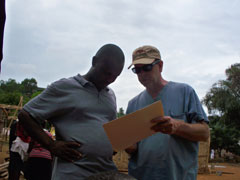
Leading a STM Medical Team
Overarching Principles
The Leader's Role
The Team Leader has a dual purpose role: that of leader and that of shepherd. These roles
might be fulfilled by either one or by two people and must
integrate with the work of the medical lead (Medical Director). The tasks to be accomplished are discussed in the following paragraphs. If there is
more than one leader it is essential that the division of responsibilities be clearly understood by everyone involved, from the planning stages all the way
through to the implementation of the trip itself. As the number of people involved in leadership increases, the probability of poor communication
increases and an even more diligent effort at positive, comprehensive communication must similarly increase.
The attitude that the individual brings to the Leadership role is critical. It must not be arrogant or disrespectful, but
rather should be that of a servant and of a student/learner. Actually, this applies equally to each and every individual
traveling with the
team, whether in leadership or not!
Leader

The leader also must be willing to make decisions. Some will be made in consultation with other key team members; some must be made in consultation
with the host; others will need to be made unilaterally by the leader. All are made after prayerful consideration concerning what is best for the team and
ultimately for the host and goal. As an example, let's consider the decision regarding how many patients to see on a given day. It is tempting to see as many
as show up, or to extend the hours later if needed. In fact, posing that question to the physicians or nurses working in the clinic might yield exactly that answer.
A wise team leader, though, will take the overall circumstances of the team into consideration and will not allow the team to become overly tired, stressed,
or fatigued. Emotional and physical energy are expended in caring for patients with great needs. The team leader must be willing to make
decisions that sometimes will be unpopular with the host or with the team, taking into consideration that ultimately the leader is in the best position to
assess and consider all the facts and factors.
A related and very important function of the team leader is that of protector. As the previous example illustrates, the team leader must consider many factors
in each decision and must ultimately be responsible for protecting the team from fatigue, overwork, and stress, as well as
from injury, illness, malnourishment, dehydration, or other physical harm.
Shepherd
The team leader also has duties as a shepherd. These involve building a sense of team spirit among
the team members, exercising spiritual leadership in the team meetings and while on the field, and providing spiritual care during the trip itself.
These functions of leadership can occasionally be overshadowed by the immediacy of the administrative duties and responsibilities that can be involved in leading a
medical team. However, to ignore this aspect of the mission is to overlook a very significant opportunity for the spiritual growth of each team member.
The potential challenges of these trips expose people to spiritual stressors in ways that are difficult or impossible to mimic or anticipate at home.
People are away from their typical support systems, their communication
networks and devices, and their routines - and the result is that people often encounter God in ways that they have never experienced before.
Team members will benefit from having someone walk through this experience alongside them. Ideally, the team leader should be the one to assist
the team in giving voice to what God
is doing in the lives of team members and the group as a whole as the trip proceeds. In doing this, everyone benefits spiritually, feels safer emotionally, and is more likely to
find someone with whom they can share.
| «Previous Page | Next Page» |